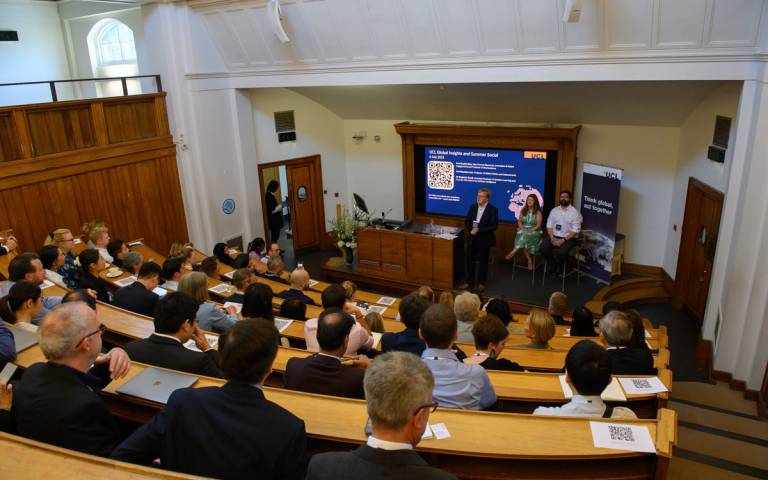Welcoming policymakers to UCL for inaugural Global Insights and Summer Social
11 July 2023
UCL Global Engagement hosted friends in the diplomatic and policy community for an evening’s discussion on artificial intelligence (AI), providing insights and implications for decisionmakers.

More than 100 guests from around the world joined the event at UCL’s Bloomsbury campus to hear from Professor Geraint Rees, Vice-Provost (Research, Innovation & Global Engagement), Professor Madeline Carr (Professor of Global Governance and Cybersecurity, UCL Computer Science) and Dr Benjamin Guedj (Associate Professor at the UCL Centre for Artificial Intelligence).
They then continued the conversation during a reception with academics, diplomats and policymakers in UCL’s Japanese Garden.
The event is part of a new series to thank the diplomatic community for their support, through offering expert insights into a complex and pressing technological or societal issue and presenting an informal opportunity to meet UCL colleagues.
The panel explored the crucial role that scientists, researchers and policymakers all play in harnessing AI's potential, addressing its ethical considerations and shaping responsible policies for inclusive adoption.
Professor Rees described the impact that universities can have within the UK innovation space, pointing to two examples of success: DeepMind and Synthesia.
AI research laboratory DeepMind was set up by Demis Hassabis, Shane Legg and Mustafa Suleyman in 2010. The business came about after Demis, who had just completed his neuroscience PhD at UCL, met research associate Shane at UCL’s Gatsby Computational Neuroscience Unit. It was acquired by Google in 2014 and now has research centres in Canada, France and the USA.
In 2023 the digital media platform Synthesia, which allows users to create professional AI-generated videos by simply typing text, became a unicorn (by reaching a market valuation of $1billion whilst still privately held). The company was founded in 2017 by a team of international researchers and entrepreneurs including Professor Lourdes Agapito (UCL Computer Science).
Professor Carr researches the ways that emerging technologies both enable and pose challenges for global security, order and governance. She spoke of the need for more ‘flexible and fast’ innovation in policy making, which has remained largely unchanged for the past 100 years, describing policy change as ‘evolution, not failure’.
Dr Guedj, originally a mathematician and statistician, spoke of the vast and rapid technical developments in AI, ranging from his own foundational research on generalisation for intelligent systems, to applications of AI to healthcare and sustainable development. He pointed to the difference he perceives between ‘artificial’ versus ‘augmented’ intelligence and ways decision makers might regulate responsible use of AI while still allowing for innovation, through dialogue between scientists and policymakers.
Dr Guedj has extensively engaged with international policymakers in this field, especially with those in his home country of France, overseeing UCL’s strategic partnership with Inria, the French national research institute in mathematics and computer science.
Professor Rees, who previously served as UCL’s Pro-Vice-Provost for AI, said: “UCL is at the forefront of research and education in AI and our work with the diplomatic community in London and abroad is essential to helping us better understand the world beyond our borders. We were delighted that so many of our valued embassy colleagues were able to join us at this fascinating event, to be able to say thank you to them in person.”
Links
- View photos from the event
- Professor Geraint Rees’ academic profile
- Professor Madeline Carr’s academic profile
- Dr Benjamin Guedj’s academic profile
- UCL Centre for Artificial Intelligence
- UCL Faculty of Engineering
- About DeepMind
- About Synthesia
- Sign up for more news and opportunities from UCL Global Engagement.
 Close
Close

